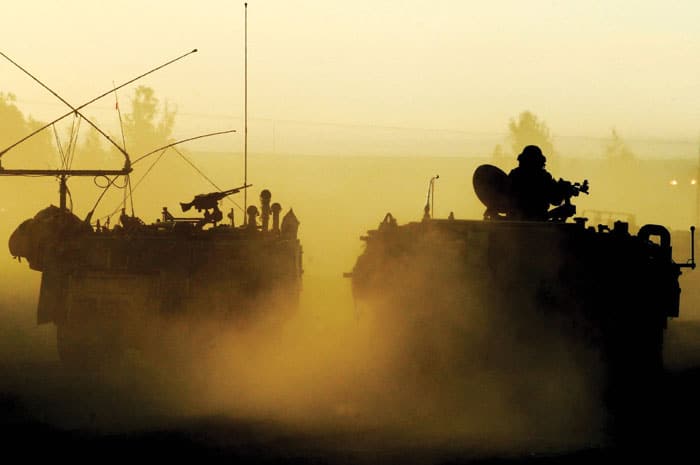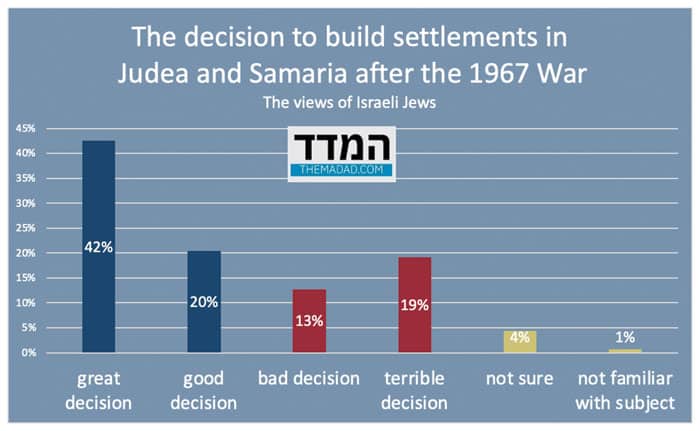 Israeli army troops on the Israel-Gaza border (chameleonseye/Getty Images)
Israeli army troops on the Israel-Gaza border (chameleonseye/Getty Images) If you don’t feel like defending the current Israeli government, or listening to someone who defends the current Israeli government, that’s understandable. This government is a problem that’s waiting for a fix, or a break. It has been in office for four months, and it is difficult to identify even one good deed for which it could take credit.
But sometimes even a bad government makes the right decisions. For example, not to be instinctively dragged into a long round of fighting in Gaza. And of course, even when it comes to Gaza policy it is not so quite easy to defend the government, because had it been the previous government – the one of Naftali Bennett, or of Yair Lapid – the Likud’s cannons of criticism would rain fire on the supposedly wretched leaders who waited a whole week with their response to rockets. If there is a trophy for hypocrisy and double-talk in the world, the Netanyahu government is sure to win it. And yet, none of this means that the decision it made on Gaza last week was wrong.
A short reminder, because we are quick to forget: Last week, following the death of a Palestinian prisoner in an Israeli jail, Hamas and Islamic Jihad bombarded Israel’s south. Israel responded with some counter bombing, but not much, and then moved to accept a quick cease fire. Criticism mounted from within the coalition against this supposedly weak response. Didn’t we promise to have a different, more aggressive policy in such cases, they asked? The answer is clear: the elected coalition made many promises, most of which should not be taken seriously. The facade of a “more right wing” policy towards Gaza is one of them.
To understand why Israel made the right choice we must consider some almost trivial basic facts:
• Israel does not have and will not soon have any type of “remedy” that will neutralize the Gaza landmine. We are stuck with the Gaza Strip under Hamas rule. That is: military action in Gaza is not intended to change the basic reality but to make Hamas hesitate before it fires a rocket.
• Deterrence wears off over time, so it should be expected that, from time to time, Israel will be forced to launch an operation in Gaza. Such operation should be launched at a time convenient for Israel. Shooting aimlessly and without results does not strengthen deterrence — it weakens it.
As I write in mid-week, Israel is still waiting to see how Gaza responds to the targeted assassination of three Islamic Jihad leaders on Monday night.
Now we can move to look at the specifics of the current round, and a word of caution is due: as I write in mid-week, Israel is still waiting to see how Gaza responds to the targeted assassination of three Islamic Jihad leaders on Monday night. On Tuesday morning Israelis were asked to get ready for a possible eruption of violence. Schools and trains in certain areas were canceled. Bomb shelters were opened. The critics – mostly rightwing radicals from within the government who weren’t in the loop, and hammered the PM for being weak – clumsily began their long journey off the populist’s tree.
As we look at Israel’s response to recent events, we must consider three things: the first is the level of support, of lack of it, the government has. Any military action would be looked at with suspicion. Is Bibi trying to change the conversation? Is he trying to make us forget about his government’s imbecility? The second is the need for action that would make a difference. Deterrence is complicated, and the public demand for quick fixes (they fired – we must fire back!) could lead politicians astray. And then, there’s the third issue: the need for hasty response was never there because of the fact that Israel had a significant achievement even before the belated targeted killing of Jihad leaders. To understand what it gained one has to remember that the ongoing crisis did not start with rocket fire from Gaza to which Israel responded weakly. It started with the death of a prisoner who was on a hunger strike. The prisoner died, and thus Israel gained. It proved to all other Palestinian prisoners that Israel would not be pressured by hunger strikes, and that it would not be deterred by the fear that a prisoner could die. It signaled to the prisoners that they ought to think twice before they go on a hunger strike and expect it to get them anywhere.
As macabre and tragic as this sound (and it is tragic) – that is deterrence. True – not deterrence against rocket fire, but rather one against hunger strikes. But deterrence is deterrence. When Israel seeks to deny its enemies various tools they can use against it, it needs to take all tools into account. It must neutralize attack tunnels, even if this means an eruption of violence. It must act to neutralize fire, even if this requires a long round of combat. It also must act to neutralize the threat of hunger strikes, even if it forces a short and painful 48 hours of tension and fire.
So, this is what truly happened in the round that as I write his column is not yet over. Whether Israel intended it in advance or not, Israel first paid in deterrence against rockets, to gain in deterrence against hunger strikes. And only then moved to strengthen its deterrence against rocket fire, by killing the leaders in Gaza in a surprise attack, when all assumed that normalcy was resumed. So yes, a lousy government made the right call. Hopefully, it would bolster deterrence against Gaza. Hopefully, it’d remind the ministers that making the right call is always an option.
Something I wrote in Hebrew
Mark your calendar: October 31 — election day.
No — it is not that the government is about to fall. Maybe that will happen too, but it is far from certain. Either way, there will be very important elections on October 31st. The most important municipal elections in the history of the State of Israel.
Why are they so important? In the coming months we will see how social tensions are manifested in municipal elections. This will be proof that something is changing in Israel, that some Israelis have internalized the need to promote a vision that produces a new reality. Which city do you want to live in? With which neighbors? In what atmosphere? Israel is going through a process of separation. The municipal elections will reflect it.
A week’s numbers
More from the Independence Day survey: 25 decisions in 75 years.

A reader’s response:
Naomi Frank asks: “Do you think the coalition is going to fall?”
Answer: More likely – not soon. No coalition party has real incentive to initiate new elections (but you know… it’s politics and things could change fast).
Shmuel Rosner is senior political editor. For more analysis of Israeli and international politics, visit Rosner’s Domain at jewishjournal.com/rosnersdomain.























 More news and opinions than at a Shabbat dinner, right in your inbox.
More news and opinions than at a Shabbat dinner, right in your inbox.